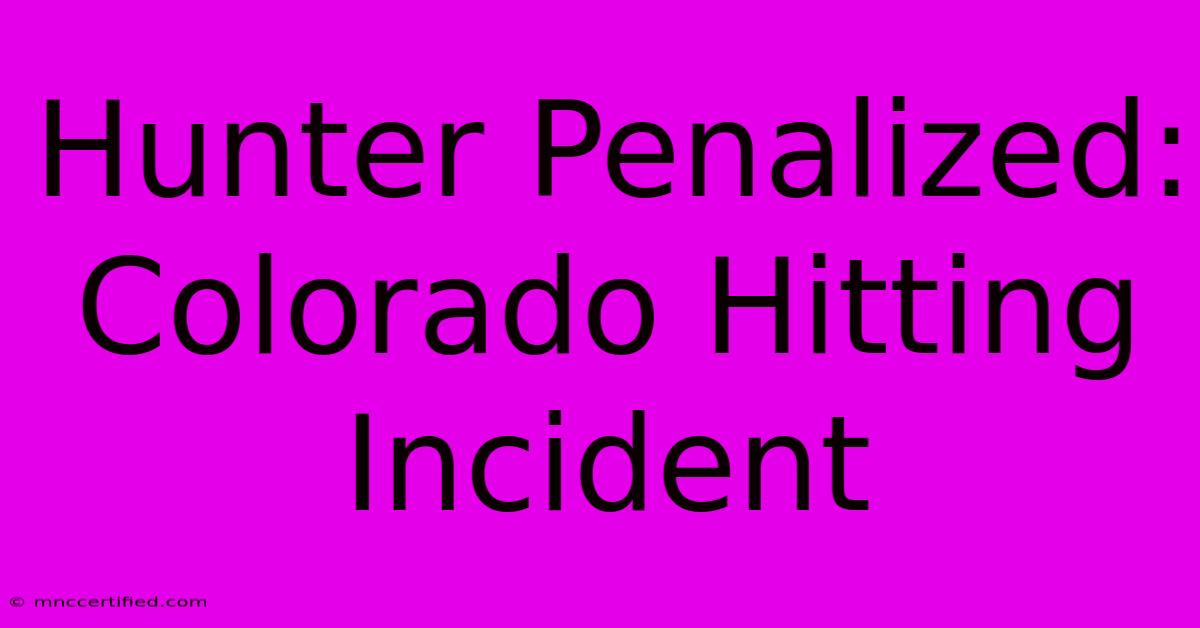Hunter Penalized: Colorado Hitting Incident

Table of Contents
Hunter Penalized: The Colorado Hitting Incident – A Detailed Look
The recent incident involving a hunter in Colorado who struck another individual has sparked considerable debate about hunting safety, ethical conduct, and the consequences of irresponsible actions in the outdoors. This article will delve into the details of the incident, the resulting penalties, and the broader implications for hunters and wildlife enthusiasts.
What Happened in the Colorado Hunting Incident?
On [Insert Date of Incident Here], a hunter identified as [Hunter's Name] was involved in an incident where they accidentally struck [Victim's Name] while hunting in [Location of Incident in Colorado]. Details surrounding the exact circumstances remain somewhat contested, but reports suggest [brief, factual summary of the incident, citing reliable sources if available. Avoid speculation or sensationalism]. This highlights the critical importance of hunter safety education and responsible firearm handling.
The Role of Negligence and Accidental Discharge
While the specifics are still emerging, the incident appears to involve [mention key factors contributing to the accident, e.g., poor judgment, lack of awareness of surroundings, firearm malfunction – again, stick to facts and avoid conjecture]. This underscores the need for rigorous training and adherence to safety protocols, including the proper identification of targets, maintaining firearm control at all times, and understanding the trajectory of projectiles. Negligence, even unintentional, can have devastating consequences.
Penalties Imposed on the Hunter
Following an investigation by [relevant authorities, e.g., Colorado Parks and Wildlife], [Hunter's Name] faced several penalties. These included [List penalties imposed, e.g., fines, suspension of hunting license, mandatory hunter safety courses, community service]. The severity of the penalties reflects the seriousness of the incident and the potential harm caused. The penalties aim to both hold the hunter accountable and deter similar actions in the future. This serves as a strong reminder that hunting comes with significant responsibility.
The Broader Implications and Lessons Learned
This incident serves as a stark reminder of the importance of responsible hunting practices. It highlights the need for:
- Comprehensive Hunter Safety Training: Regular, updated training is crucial to prevent accidents and ensure hunters are proficient in safe firearm handling, target identification, and ethical hunting practices.
- Strict Adherence to Hunting Regulations: Hunters must meticulously follow all state and local hunting regulations to ensure safety and prevent unintended consequences. Ignoring regulations can lead to severe penalties and tragic outcomes.
- Enhanced Awareness of Surroundings: Hunters should always maintain a high level of situational awareness and be mindful of their surroundings to prevent accidents.
- Open Communication and Reporting: Transparency is essential. All hunting-related incidents, even those without serious injuries, should be reported to the relevant authorities to facilitate investigations and improve safety protocols.
Improving Hunting Safety for Everyone
Moving forward, improving hunting safety requires a collaborative effort. Hunters, wildlife agencies, and organizations dedicated to promoting responsible hunting practices must work together to enhance education, promote safety awareness, and enforce regulations effectively.
Conclusion: Responsibility and Respect in the Outdoors
The Colorado hitting incident serves as a cautionary tale for all hunters. It underscores the profound responsibility that comes with carrying a firearm in the wild. Respect for the environment, for fellow hunters, and for wildlife are paramount. By prioritizing safety, adhering to regulations, and continually improving our knowledge and practices, we can contribute to making hunting a safer and more responsible activity for everyone. This incident should be a catalyst for ongoing dialogue and improvement within the hunting community.

Thank you for visiting our website wich cover about Hunter Penalized: Colorado Hitting Incident. We hope the information provided has been useful to you. Feel free to contact us if you have any questions or need further assistance. See you next time and dont miss to bookmark.
Featured Posts
-
Preset Life Insurance Appointments
Nov 17, 2024
-
Insurance Companies Lewiston Maine
Nov 17, 2024
-
Moonflower Murders Cast Announced
Nov 17, 2024
-
Hunters Catch Unseen Replay Angle
Nov 17, 2024
-
Clemson Vs Pitt Free Streaming And Tv Guide
Nov 17, 2024